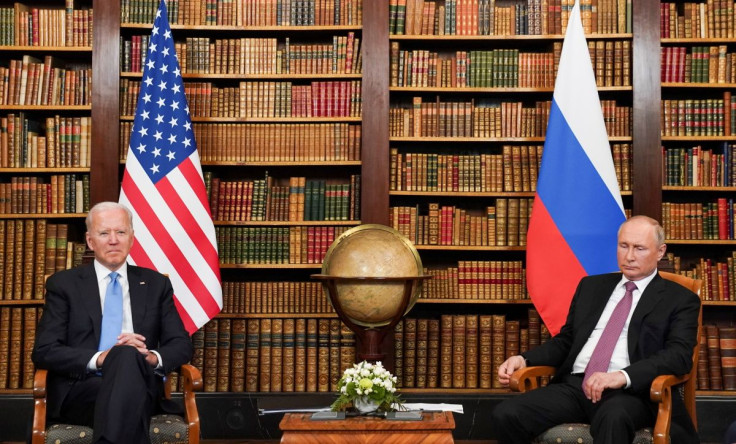Biden And Putin Speak; U.S. Pulls Embassy Staff, Military Trainers From Ukraine

U.S. President Joe Biden and Russia's Vladimir Putin spoke by phone for an hour on Saturday after Washington and its allies warned that Russian forces could invade Ukraine at any moment.
The U.S. State Department ordered most of its embassy staff to leave Ukraine, adding to its call on Friday for private citizens to get out of the country within 48 hours. The Pentagon said it was withdrawing about 150 military trainers.
In the latest effort to avert hostilities, the Biden-Putin call began at 11:04 a.m. Eastern time (1604 GMT) and ended at 12:06 p.m., a White House official said.
Russia's military buildup near Ukraine and a surge of military activity has fueled fears that Russia could invade. Russia denies having any such plans.
Earlier on Saturday, French President Emmanuel Macron told Putin that sincere negotiations were incompatible with an escalation in tensions over Ukraine, France said.
Biden and Macron are due to speak after their separate calls with Putin, according to a French presidency official. The official said there were no indications from what Putin told Macron that Russia is preparing an offensive against Ukraine.
"We are nevertheless extremely vigilant and alert to the Russian (military) posture in order to avoid the worst," the official said.
Washington said on Friday that a Russian invasion of Ukraine, likely beginning with an air assault, could occur at any time.
Bulgaria, Portugal, Australia, New Zealand, Germany, Italy, the Netherlands and other countries have also urged their citizens to leave Ukraine.
Moscow has repeatedly disputed Washington's version of events, saying it has massed more than 100,000 troops near the Ukrainian border to maintain its own security against aggression by NATO allies.
Russia, which has accused Western nations of spreading lies to distract from their own acts, meanwhile said on Saturday that it had decided to "optimise" its diplomatic staff numbers in Ukraine, fearing "provocations" by Kyiv or others.
It said its embassy and consulates in Ukraine continued to perform their key functions.
PATHS OF AGGRESSION, DIPLOMACY
U.S. Secretary of State Antony Blinken said Washington would impose swift economic sanctions if Putin decides to invade.
"I continue to hope that he will not choose the path of renewed aggression and he'll chose the path of diplomacy and dialogue," Blinken told reporters after a meeting with Pacific leaders in Fiji. "But if he doesn't, we're prepared."
In a phone call later with Blinken, Russia's top diplomat Sergei Lavrov accused the United States and its allies of waging a "propaganda campaign" about Russian aggression towards Ukraine, the Russian foreign ministry said.
Russian Defence Minister Sergei Shoigu and his U.S. counterpart Lloyd Austin also talked by phone on Saturday, Interfax news agency and the Pentagon said.
Also on Saturday, the Russian military said it had used "appropriate means" to make a U.S. submarine depart from Russian waters in the far east after the vessel ignored a Russian request to leave, Interfax news agency reported.
The submarine was detected near the Pacific Kuril islands in Russia's waters as Russia conducted naval exercises, the military was quoted as saying.
Putin, jostling for influence in post-Cold War Europe, is seeking security guarantees from Biden to block Kyiv's entry into NATO and missile deployments near Russia's borders.
Washington regards many of the proposals as non-starters but has pushed the Kremlin to discuss them jointly with Washington and its European allies.
Still, Biden has long believed that one-on-one engagement with Putin may be the best chance at a resolution. Two calls in December between Biden and Putin produced no breakthroughs but set the stage for diplomacy between their aides. The two leaders have not spoken since, and diplomats from both sides have struggled to find common ground.
Four-way talks in Berlin between Russia, Ukraine, Germany and France on Thursday made no progress.
Several thousand Ukrainians rallied in Kyiv on Saturday to show unity amid fears of an invasion, as Ukraine's leader told people not to panic and pushed back against what he said was a glut of bleak war predictions being reported in the media.
Still, Washington planned to send 3,000 extra troops to Poland, Ukraine's western neighbor, in coming days to try to help reassure NATO allies, four U.S. officials told Reuters. They are in addition to 8,500 already on alert for deployment to Europe if needed.
© Copyright Thomson Reuters 2024. All rights reserved.







